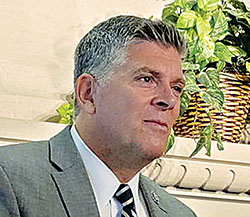By SHELLEY EPSTEIN
In the adjacent article, my old friend Jim Nowlan outlines a political path forward for Congressman Adam Kinzinger. Since Illinois Democrats’ unconscionable and immoral gerrymandering lumped Kinzinger and Darin LaHood in the same conservative and Trumpy district, Kinzinger needs a different alternative if he is to continue in public life.
But what about LaHood? What of his political future?

Darin LaHood (PHOTO COURTESY TSPR)
When Donald Trump deviated from long-time Republican orthodoxy and pushed for tariffs, LaHood said tariffs against China made sense. That position is at odds with the Illinois Farm Bureau, which opposed the tariffs. LaHood’s existing and new districts are largely agricultural, and he has consistently touted his support for farmers.
Caterpillar has been sending earthmoving equipment overseas from its Peoria base for generations. The company is known in Washington, D.C., as a foremost free trader. Still, LaHood followed Trump rather than defend his district’s most important employer.
When the House passed legislation to build and repair roads, bridges, railway and broadband in 2020, during Trump’s presidency, and again in 2021 after Trump left office, LaHood again sided with Trump and voted no. That vote put his loyalty to Trump ahead of the economic interests of his district. Caterpillar and its thousands of central Illinois workers would have benefited greatly from those national investments. Indeed, 19 Republican senators and
13 GOP House members voted yes on the 2021 infrastructure legislation.
Those aren’t the only Trump-centric votes on LaHood’s resume. It’s no surprise he voted against impeachment (perhaps the defining GOP “sin” committed by Kinzinger). LaHood twice voted against creating congressional committees to investigate the Jan. 6 insurrection at the Capitol. Kinzinger now sits on that committee. And LaHood joined a case before the Supreme Court to discount presidential votes in Georgia, Michigan, Pennsylvania, and Wisconsin, all states Trump narrowly lost, as the former president sought to perpetuate the lie that he won the 2020 election.
The Supreme Court rejected the case, but Trump and his acolytes have continued to challenge the election results.
Personally, LaHood is engaging, kind and appears genuinely interested in people. I’ve known Darin since he was a young prosecutor and I can unequivocally say he is a nice fellow. Yet he has thrown his lot in with the most divisive, hateful members of his party. He has aligned his political future with those who have hurled slurs, failing to condemn such uncivil and inappropriate rhetoric, as Kinzinger did.
In doing so, LaHood has diminished himself and his office. And he has compromised his future.
There may be a political calculus to his actions. The only serious — or halfway serious — challenge during his tenure came in a GOP primary from an extreme Right disciple of Breitbart News. LaHood easily dispatched him and has since routinely run up pluralities of nearly 70 percent.
But there is a cost to his hard-Right-ward movement. LaHood was always a conservative, more so than his father, former Congressman Ray LaHood. There was once talk of Darin running for statewide office, but it’s hard to imagine him appealing to suburban Chicago swing voters essential for any Republican to win in Illinois — considering his current resume. His adherence to Trump doctrine is politically compromising.
Compare that to LaHood the elder. Even before he was elected to his first term in 1994, Ray LaHood took an independent, principled stand when he refused to sign Newt Gingrich’s so-called Contract with America. LaHood was one of three Republicans to do so.
Following his conscience instead of political expediency cost him. Ray was not embraced when Gingrich became House Speaker. He was not considered a team player. Yet Ray LaHood gained something more important: independence and integrity. Those traits stayed with him throughout his entire career, both as a congressman and a Cabinet member.
By positioning himself with those who follow the worst instincts of Trumpism, LaHood the younger nearly guarantees himself re-election to a safe seat, rather than taking the path of a principled, independent, bipartisan leader. He’ll stay in office, but for what purpose?
When I was a boy, I read John Kennedy’s Pulitzer Prize winning book “Profiles in Courage,” stories about eight senators who defied the wishes of their parties and constituents to take moral stands for what was right for the nation. America needs more lawmakers who demonstrate that kind of political courage.
Shelley Epstein is a former reporter at the Journal Star, where for more than 30 years he covered the city council, county board and Illinois state government before stints as an assistant city editor and editorial writer. He is also a retired associate vice president for communications at Bradley University.

5 comments for “Can Darin LaHood continue to compromise his own constituency?”